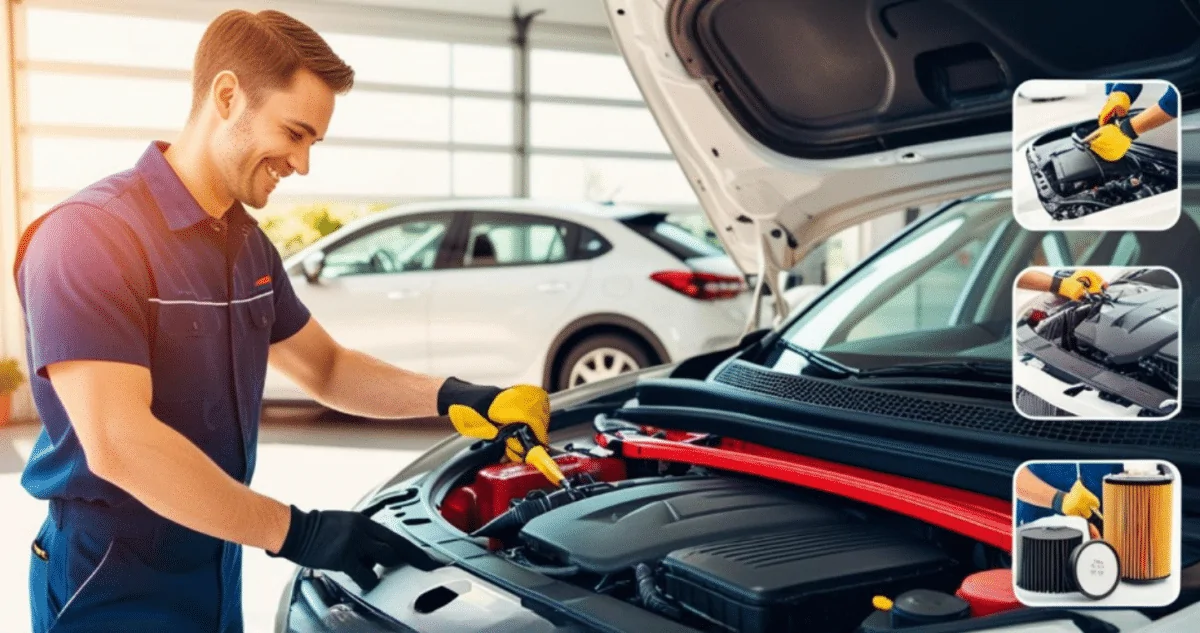
Growing up, owning a car is one of the biggest milestones in life. After all the saving and effort, your first car becomes a personal achievement and a part of your memories. But maintaining your car is what truly determines its long-term value, and more importantly, your car’s lifespan.
Maintaining your vehicle ensures it continues to run efficiently for years while giving you the best value. According to some vehicle maintenance guides, sticking to a regular schedule can prevent the most common car issues and save you from costly repairs down the line.
While some people overlook regular upkeep, the truth is that even basic vehicle maintenance goes a long way. Not only does it keep your car running smoothly, but it also protects your safety, saves money on repairs, and improves resale value.
Let’s break down six essential auto maintenance tips to help extend your car’s lifespan and keep it in peak condition.
Tip 1: Regular Oil Change
This tip is at the top of the list for a reason: knowing when to change oil is essential.
Engine oil lubricates your car engine, reduces friction, and prevents further wear and tear. With time, the oil breaks down and loses its properties.
This leads to increased friction, causing gradual damage to the engine.
Regular oil changes greatly extend a car’s lifespan. But how do you know when to change oil?
It’s quite simple: if you notice the oil has turned dark or dirty, it’s the cue to book an appointment with your trusted auto repair shop.
Some cars have lights that blink when it’s time to change the oil. But some cars do not have such systems in place. In that case, you should change the oil every 3000 to 6000 miles.
Also, check the car owner’s manual. It outlines the expected time and miles when to change the oil.
Tip 2: Tire Care & Fuel Efficiency
Tires dictate much of your car’s performance and safety.
Did you know that neglecting tire maintenance can impact fuel usage? Additionally, continued wear that result in a fatal accident.
As we reach the winter months, tire pressure drops. For instance, with every 10°F drop, tire pressure decreases by 1 psi.
Low tire pressure negatively impacts fuel efficiency. Some cars are equipped with relevant systems. Hence, you will see TPMS warning lights.
How can you maintain the tires to ensure safety and fuel efficiency?
Here are some auto maintenance tips to keep tires in good shape:
Get the tires checked at least once a month
Rotate tires regularly (every 6,000 miles)
Check air pressure every two weeks
Tip 3: Brake System Maintenance
If you take your car for regular maintenance to an auto repair shop, brake system maintenance is top of the list.
Brakes do wear out with time. Weather and moisture are also enemies for brake plates. Over time, you may experience decreased and sudden issues when applying the brakes.
Also, if you listen to squeaking and grinding noises, chances are the brakes are worn out.
If you find any of these issues, do not delay and get your car checked instantly. Sometimes, brake fluids are all we need. Else, a quick change of brake pads would save you from misfortune.
Tip 4: Transmission Fluid
The car gearbox relies on lubrication. Transmission fluid reduces friction and prevents overheating.
Just like engine oil, the transmission fluid becomes less effective and causes abrasion. To keep the gears running smoothly, check the transmission fluids regularly.
Signs of transmission fluid gone bad: it appears darker in color and smells burnt.
Tip 5: Battery for the Win
The battery is the heart of the car. It manages the whole electric system of the car. If the battery’s functionality reduces, you won’t be able to start the car.
A well-maintained car battery can last you for years. If you follow all the mentioned auto maintenance tips in this guide, your car will have a long battery life.
Here are some tips to maintain the battery:
Check the terminals – they should be clean and free from corrosion.
Don’t drive frequently in short bursts – the battery may not be fully recharged.
Tip 6: Air Filters
Air filters filter all the debris and contaminants from the engine. A dirty air filter results in reduced engine performance, which reduces fuel efficiency and causes damage to the engine.
Replacing the filters can extend the car’s lifespan significantly.
As a rule, after every 20,000 miles (considering driving conditions), change the air filters. If you live in a dusty or heavy-traffic environment, get air filters checked frequently at your trusted auto repair shop.
Extend the Car’s Lifespan with Regular Maintenance
As cliché as it may sound, routine car maintenance is key to a smooth-running vehicle. It extends the car’s lifespan and quality.
If you follow these auto maintenance tips, such as the engine oil changes, maintaining tires and brakes, and timely changing of transmission fluid and air filters, your car will run smoothly for many years.
These routine checks are protocols most auto repair shops follow.
Dr. Ralph’s Automotive Service Centre offers the best in car inspections in Philadelphia, including tire maintenance, oil changes, and other mechanical repairs.
If your car seems low on performance and hasn’t had a workup in months, it’s time to book an appointment.
